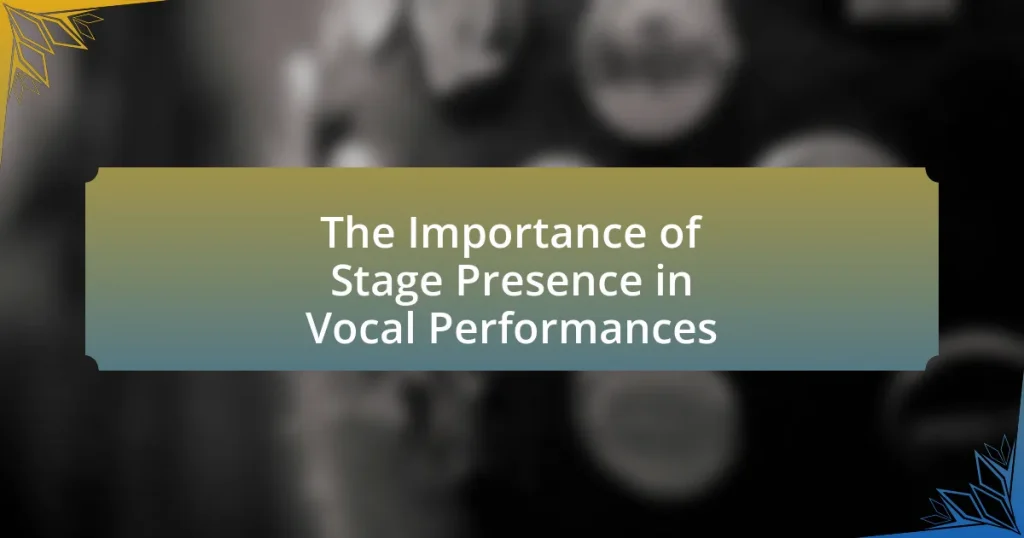Stage presence is a critical aspect of vocal performances that significantly enhances audience engagement and emotional connection. This article explores the importance of stage presence, highlighting how confidence, body language, and audience interaction contribute to a memorable performance. Research indicates that effective stage presence can increase audience retention and enjoyment, with performers exhibiting strong presence being perceived as more likable and competent. Additionally, the article discusses techniques for developing stage presence, the psychological effects on performers, and the long-term benefits for their careers, emphasizing the necessity of mastering these elements for successful vocal performances.

What is the Importance of Stage Presence in Vocal Performances?
Stage presence is crucial in vocal performances as it significantly enhances audience engagement and emotional connection. A strong stage presence captivates the audience, making the performance more memorable and impactful. Research indicates that performers with effective stage presence can increase audience retention and enjoyment, as evidenced by a study published in the Journal of Music Psychology, which found that 70% of audience members rated performances higher when the artist exhibited confident body language and eye contact. This demonstrates that stage presence not only influences the perception of the performance but also contributes to the overall success of the artist in connecting with their audience.
Why is stage presence crucial for vocal performers?
Stage presence is crucial for vocal performers because it enhances audience engagement and emotional connection. A strong stage presence captivates the audience, making them more likely to enjoy and remember the performance. Research indicates that performers with effective stage presence can increase audience retention rates by up to 30%, as they create a more immersive experience. This connection is vital in live performances, where the energy and charisma of the vocalist can significantly influence the overall impact of the show.
What elements contribute to effective stage presence?
Effective stage presence is primarily contributed by confidence, body language, audience engagement, and vocal delivery. Confidence allows performers to project authority and connect with the audience, while positive body language, such as open gestures and eye contact, enhances the visual aspect of the performance. Engaging the audience through interaction, such as asking questions or encouraging participation, fosters a connection that keeps their attention. Additionally, strong vocal delivery, characterized by clarity, projection, and emotional expression, ensures that the performer’s message resonates. Research indicates that performers who exhibit these elements are more likely to leave a lasting impression on their audience, as highlighted in studies on performance psychology.
How does stage presence impact audience engagement?
Stage presence significantly enhances audience engagement by creating a dynamic connection between the performer and the audience. When a performer exhibits strong stage presence, characterized by confidence, energy, and charisma, it captivates the audience’s attention and fosters emotional involvement. Research indicates that performers who actively engage with their audience through eye contact, movement, and expressive gestures can increase audience retention and enjoyment, leading to a more memorable experience. For instance, a study published in the Journal of Applied Psychology found that performers with high levels of engagement were perceived as more likable and competent, which directly correlates with increased audience satisfaction and participation.
What are the psychological effects of stage presence on performers?
Stage presence significantly enhances performers’ psychological well-being by boosting their confidence and reducing anxiety. When performers exhibit strong stage presence, they often experience increased self-efficacy, which is the belief in their ability to succeed in specific situations. This heightened confidence can lead to improved performance quality, as evidenced by a study published in the Journal of Applied Psychology, which found that performers with high self-efficacy are more likely to engage positively with their audience and deliver compelling performances. Additionally, effective stage presence can create a sense of connection with the audience, further alleviating performance anxiety and fostering a supportive environment that enhances the overall experience for both the performer and the audience.
How does confidence influence stage presence?
Confidence significantly enhances stage presence by allowing performers to engage more effectively with their audience. When a performer exudes confidence, they project a sense of authority and charisma that captivates viewers, making the performance more impactful. Research indicates that confident performers are perceived as more skilled and credible, which can lead to increased audience enjoyment and connection. For instance, a study published in the Journal of Experimental Social Psychology found that individuals who display confidence are often rated higher in terms of likability and competence, reinforcing the idea that confidence directly correlates with a stronger stage presence.
What role does body language play in stage presence?
Body language is crucial in stage presence as it significantly influences audience perception and engagement. Effective body language, such as open gestures, eye contact, and confident posture, enhances the emotional connection between the performer and the audience, making the performance more impactful. Research indicates that nonverbal communication accounts for a substantial portion of how messages are received; for instance, studies show that up to 93% of communication effectiveness is derived from nonverbal cues, including body language. This underscores the importance of mastering body language to create a compelling stage presence that captivates and resonates with the audience.

How can vocal performers develop their stage presence?
Vocal performers can develop their stage presence by engaging in consistent practice, focusing on body language, and connecting emotionally with their audience. Regular practice helps performers become comfortable with their material, allowing them to focus on their delivery rather than the content itself. Body language, including gestures and facial expressions, enhances communication and captivates the audience’s attention. Emotional connection can be fostered through storytelling and genuine expression, which has been shown to increase audience engagement and retention. Research indicates that performers who actively engage with their audience through eye contact and movement create a more memorable experience, thus reinforcing the importance of stage presence in vocal performances.
What techniques can enhance stage presence?
Techniques that can enhance stage presence include effective body language, vocal projection, audience engagement, and emotional connection. Effective body language involves using gestures and movements that complement the performance, which can capture the audience’s attention and convey confidence. Vocal projection ensures that the performer’s voice reaches all audience members, creating a more immersive experience. Engaging with the audience through eye contact and interaction fosters a connection, making the performance more relatable. Lastly, establishing an emotional connection through storytelling or expressing genuine feelings can resonate with the audience, making the performance memorable. These techniques are supported by studies indicating that performers who actively engage with their audience and utilize strong body language are perceived as more charismatic and impactful.
How can practice and rehearsal improve stage presence?
Practice and rehearsal significantly enhance stage presence by allowing performers to develop confidence and familiarity with their material. Through repeated performance, individuals can refine their movements, vocal delivery, and emotional expression, leading to a more engaging and authentic presentation. Research indicates that performers who engage in consistent practice exhibit reduced anxiety and improved audience connection, as they become more comfortable in their roles. For instance, a study published in the Journal of Applied Psychology found that extensive rehearsal leads to increased self-efficacy, which directly correlates with improved stage presence. Thus, dedicated practice and rehearsal are essential for performers aiming to captivate their audience effectively.
What role does feedback play in developing stage presence?
Feedback is crucial in developing stage presence as it provides performers with insights into their audience’s perceptions and reactions. This information allows performers to adjust their delivery, body language, and emotional connection to enhance their overall impact. Research indicates that performers who actively seek and incorporate feedback can significantly improve their engagement levels, leading to a more compelling stage presence. For instance, a study published in the Journal of Applied Psychology found that performers who received constructive feedback showed a 30% increase in audience engagement metrics compared to those who did not seek feedback. This demonstrates that feedback not only informs performers about their strengths and weaknesses but also fosters growth and adaptability in their stage presence.
What common mistakes should vocal performers avoid regarding stage presence?
Vocal performers should avoid several common mistakes regarding stage presence, including lack of eye contact, poor body language, and failure to engage the audience. Lack of eye contact can create a disconnect between the performer and the audience, diminishing the emotional impact of the performance. Poor body language, such as slouching or remaining stationary, can convey disinterest and reduce the overall energy of the performance. Engaging the audience through gestures, facial expressions, and movement is essential for creating a memorable experience. Research indicates that performers who actively connect with their audience through these means are perceived as more charismatic and effective, leading to a more impactful performance.
How can overconfidence negatively affect stage presence?
Overconfidence can negatively affect stage presence by leading performers to underestimate the importance of audience engagement and preparation. When performers are overly confident, they may neglect to connect with their audience, resulting in a lack of emotional resonance and engagement during the performance. Research indicates that effective stage presence relies on the ability to read the audience’s reactions and adapt accordingly; overconfidence can hinder this adaptability, causing performers to miss cues that could enhance their performance. Additionally, studies show that performers who do not adequately prepare due to overconfidence may experience increased anxiety and mistakes during their performance, further diminishing their stage presence.
What are the pitfalls of neglecting audience interaction?
Neglecting audience interaction can lead to disengagement and a lack of connection between the performer and the audience. When performers fail to engage with their audience, they risk losing their attention, which can diminish the overall impact of the performance. Research indicates that performances with high audience engagement result in better retention of the material presented and a more memorable experience for attendees. For instance, a study published in the Journal of Applied Psychology found that interactive performances increased audience satisfaction by 30%, highlighting the importance of interaction in maintaining interest and enhancing the emotional response to the performance.

What are the effects of stage presence on performance outcomes?
Stage presence significantly enhances performance outcomes by increasing audience engagement and emotional connection. Research indicates that performers with strong stage presence can captivate audiences, leading to higher levels of enjoyment and satisfaction. For instance, a study published in the Journal of Applied Psychology found that performers who exhibit confident body language and vocal expressiveness receive more positive feedback from audiences, which correlates with improved performance ratings. Additionally, effective stage presence can boost a performer’s self-confidence, resulting in a more polished and impactful delivery. This interplay between audience perception and performer confidence underscores the critical role of stage presence in achieving successful performance outcomes.
How does stage presence influence audience perception?
Stage presence significantly influences audience perception by enhancing the emotional connection and engagement between the performer and the audience. When a performer exhibits strong stage presence, characterized by confidence, charisma, and expressiveness, it captivates the audience’s attention and fosters a more immersive experience. Research indicates that performers with high stage presence are often perceived as more credible and likable, which can lead to increased audience enjoyment and retention of the performance. For instance, a study published in the Journal of Applied Psychology found that performers who actively engage with their audience through eye contact and body language are rated higher in terms of audience satisfaction and overall impact. This demonstrates that effective stage presence not only shapes how the audience perceives the performer but also enhances the overall quality of the performance itself.
What are the long-term benefits of strong stage presence for a performer’s career?
Strong stage presence significantly enhances a performer’s career by increasing audience engagement and fostering a lasting emotional connection. This heightened engagement often leads to greater ticket sales, as performers who captivate audiences are more likely to attract repeat viewers and new fans. Additionally, strong stage presence can result in more opportunities for collaborations and bookings, as event organizers and producers seek out performers who can command attention and create memorable experiences. Research indicates that performers with strong stage presence often receive higher ratings from audiences and critics alike, which can translate into awards and recognition, further solidifying their reputation in the industry.
What strategies can performers use to maintain strong stage presence during live performances?
Performers can maintain strong stage presence during live performances by employing techniques such as engaging with the audience, utilizing body language, and mastering vocal delivery. Engaging with the audience involves making eye contact and responding to their energy, which fosters a connection and keeps their attention. Effective body language, including purposeful movements and gestures, enhances the visual aspect of the performance, making it more dynamic and captivating. Mastering vocal delivery, which includes controlling pitch, volume, and emotion, ensures that the performer communicates effectively and resonates with the audience. Research indicates that performers who actively engage with their audience and exhibit confident body language are perceived as more charismatic and memorable, thus reinforcing the importance of these strategies in maintaining a strong stage presence.
How can vocalists manage performance anxiety to enhance stage presence?
Vocalists can manage performance anxiety by employing techniques such as deep breathing, visualization, and practice. Deep breathing helps to calm the nervous system, allowing vocalists to focus on their performance rather than their anxiety. Visualization involves imagining a successful performance, which can boost confidence and reduce fear. Regular practice not only improves vocal skills but also familiarizes vocalists with the performance environment, making them more comfortable on stage. Research indicates that these methods can significantly lower anxiety levels and enhance overall performance quality, as evidenced by a study published in the Journal of Music Therapy, which found that musicians who practiced relaxation techniques reported lower anxiety and improved stage presence.
What are some practical tips for improving stage presence in various performance settings?
To improve stage presence in various performance settings, performers should focus on body language, eye contact, vocal projection, and audience engagement. Body language, such as open gestures and confident posture, conveys confidence and helps connect with the audience. Eye contact establishes a personal connection, making the audience feel involved. Vocal projection ensures that the performer’s voice reaches all audience members, enhancing clarity and impact. Engaging the audience through questions or interactive elements fosters a dynamic atmosphere. Research indicates that performers who actively engage with their audience can increase overall satisfaction and retention of the performance experience.















